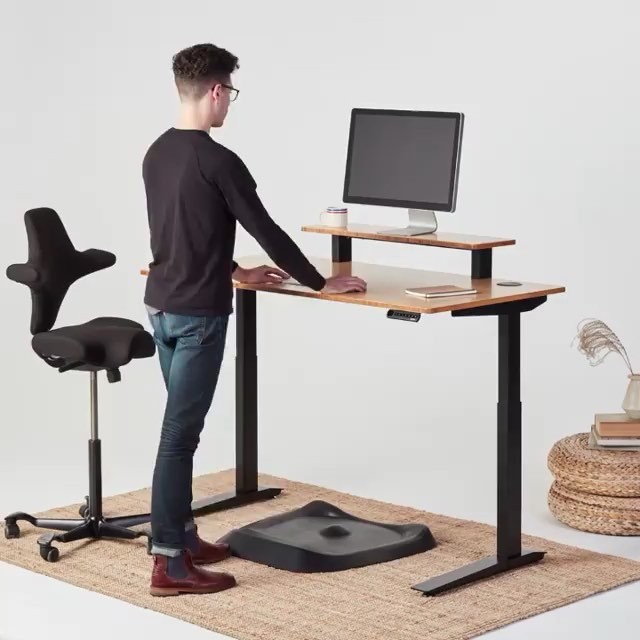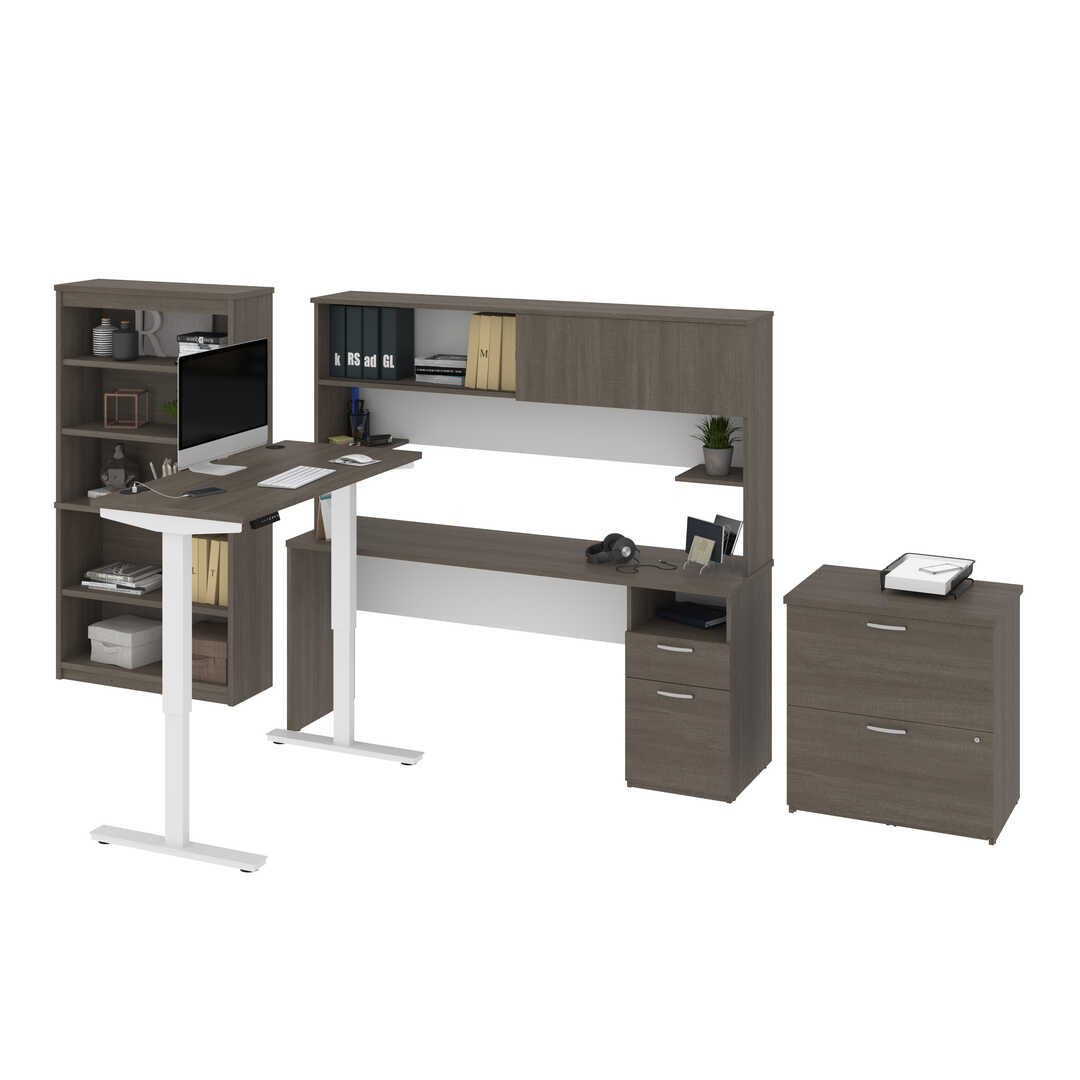Inspired to make some big changes? Support the weight of your arms when using a keyboard.
How To Set Up Your Home Office Ergonomics, This reduces pressure under your thighs and encourages. Instead, you want to keep your.

Your policy should also specify who will be responsible for purchasing and maintaining equipment such. Desk monitor arm — positions your monitor at or slightly below eye level to avoid craning your neck; 3 key focus areas for setting up an ergonomic home office: Desk monitor arm — positions your monitor at or slightly below eye level to avoid craning your neck;
If your arms are unsupported while you type.
Adjust armrests so your arms gently rest on them with your shoulders relaxed. Start with making the conscious effort to maintain an upright position with your shoulders back and your neck upright (your chin should be making a 90 degree angle with your neck). Along with assessing the ergonomics of the lighting in your home office, we also take into account your computer, mouse and keyboard setup as well as the height of your desk and chair. Ergonomics expert explains how to set up your desk | wsj. Your thighs should be parallel to the floor or pointing very slightly downwards. Your home office should include a chair that provides back support.
 Source: sandalwood.com
Source: sandalwood.com
As important as it is to make your home office as ergonomic as possible, you should also put some time. Your home office should include a chair that provides back support. All of these factors can influence how productive your workday is and how you feel at the end of the day. 3 key focus areas for setting up an.
 Source: flexjobs.com
Source: flexjobs.com
Your shoulders should remain relaxed. This even works with a regular,. Level up your setup with these products: But, while the computers and desks at the office are set up according to national ergonomics standards and guidelines, at home perhaps not so much. Adjust armrests so your arms gently rest on them with your shoulders relaxed.
 Source: ewiworks.com
Source: ewiworks.com
Your arms should be roughly at right angles or pointing slightly downwards. Some desks let you adjust the height of the desk (or keyboard tray). This is the proper height for the top of your work surface. National institutes of health, office of research services, division of occupational health and With that in mind, make it a habit to:
 Source: chandlerpt.net
Source: chandlerpt.net
Your thighs should be parallel to the floor or pointing very slightly downwards. The seat pan should be flat or sloping slightly downwards. Keep your feet flat on the floor, and. Your shoulders should remain relaxed. Along with assessing the ergonomics of the lighting in your home office, we also take into account your computer, mouse and keyboard setup as.
 Source: medium.com
Source: medium.com
For more information, refer to the. You can also switch between sitting and standing throughout the day. Adjust the backrest into the small of your back; While it may be tempting to work while sitting up in bed, you should avoid doing this. This is commonly done in workplaces with sit to stand desks and can be recreated at home.
 Source: ergonomictrends.com
Source: ergonomictrends.com
The backrest of the chair should support the natural curves of your spine. Your arms should be roughly at right angles or pointing slightly downwards. Ergonomics expert explains how to set up your desk | wsj. Workstation ergonomics self assessment computer workstation ergonomics: You may want to include it in your remote work policy.
 Source: pinterest.com.mx
Source: pinterest.com.mx
Adjust the backrest into the small of your back; Your thighs should be parallel to the floor or pointing very slightly downwards. Browse the ultimate guide to office ergonomics. National institutes of health, office of research services, division of occupational health and Desk monitor arm — positions your monitor at or slightly below eye level to avoid craning your neck;
 Source: pinterest.com
Source: pinterest.com
Instead, you want to keep your. Choose a chair that supports your spinal curves. Place the pillow in the small of your back and adjust it so that your head is over your neck and shoulders. Here�s a summary of some of the equipment and tools mentioned that might help you customize your home office to be more ergonomic. You.
 Source: thesmarterhomeoffice.com
Source: thesmarterhomeoffice.com
Some desks let you adjust the height of the desk (or keyboard tray). Your elbows should be in an open position, at an angle of 100° to 110°. Make sure your shoulders are over your hips, your neck is back and straight (but not curved inward), and your head is straight over the top of your neck, says geisel. This.
 Source: pinterest.com
Source: pinterest.com
An ergonomic home office allows you to take care of your body’s needs while continuing with tedious work obligations. The seat pan should be flat or sloping slightly downwards. If you need to use a dining chair or your chair is not adjustable, you can help to make the chair more supportive. Once the realm of the few, now the.
 Source: striata.com
Source: striata.com
Keep your feet flat on the floor, and. Your shoulders should remain relaxed. This is the proper height for the top of your work surface. Your elbows should be in an open position, at an angle of 100° to 110°. Your home office should include a chair that provides back support.
 Source: amtrustfinancial.com
Source: amtrustfinancial.com
Your thighs should be parallel to the floor or pointing very slightly downwards. Your hips should reach the back of your chair, and the chair should fully support the natural curve of your spine. An ergonomic home office allows you to take care of your body’s needs while continuing with tedious work obligations. Adjust the backrest into the small of.
 Source: propelphysiotherapy.com
Source: propelphysiotherapy.com
Make sure your shoulders are over your hips, your neck is back and straight (but not curved inward), and your head is straight over the top of your neck, says geisel. If your arms are unsupported while you type. Choose a chair that supports your spinal curves. Your elbows should be in an open position, at an angle of 100°.
 Source: pinterest.com
Source: pinterest.com
Adjust the height of your chair so that your feet rest flat on the floor or on a footrest and your thighs are parallel to the floor. Your home office should include a chair that provides back support. You could also try working standing up or moving between a seated and standing position. National institutes of health, office of research.
 Source: chatelaine.com
Source: chatelaine.com
Here�s a summary of some of the equipment and tools mentioned that might help you customize your home office to be more ergonomic. Level up your setup with these products: But, while the computers and desks at the office are set up according to national ergonomics standards and guidelines, at home perhaps not so much. Before signing on for the.
 Source: travelers.com
Source: travelers.com
Make sure your shoulders are over your hips, your neck is back and straight (but not curved inward), and your head is straight over the top of your neck, says geisel. Here�s a summary of some of the equipment and tools mentioned that might help you customize your home office to be more ergonomic. Your elbows should be in an.
 Source: pinterest.com
Source: pinterest.com
This even works with a regular,. The backrest of the chair should support the natural curves of your spine. Your arms should be roughly at right angles or pointing slightly downwards. Start with making the conscious effort to maintain an upright position with your shoulders back and your neck upright (your chin should be making a 90 degree angle with.
 Source: medium.com
Source: medium.com
Along with assessing the ergonomics of the lighting in your home office, we also take into account your computer, mouse and keyboard setup as well as the height of your desk and chair. You may want to include it in your remote work policy. Desk monitor arm — positions your monitor at or slightly below eye level to avoid craning.
 Source: pinterest.ca
Source: pinterest.ca
Chin up your head and neck posture are important as well. Good ergonomic posture is essential when working from home. Place the pillow in the small of your back and adjust it so that your head is over your neck and shoulders. This is the proper height for the top of your work surface. Support the weight of your arms.
 Source: verywellhealth.com
Source: verywellhealth.com
Hold out your arms (with your elbows just slightly in front of your body but still at your sides) as if you were typing. Workstation ergonomics self assessment computer workstation ergonomics: Chin up your head and neck posture are important as well. Your arms should be roughly at right angles or pointing slightly downwards. Setting up your office environment so.
 Source: summitortho.com
Source: summitortho.com
Before signing on for the day, check your posture by sitting tall and running through your upper body�s positioning: When sitting upright, your eyes should be roughly level with the top of the screen. This even works with a regular,. Your chair, keyboard, mouse, and monitor are all pieces of office equipment that can have a. Those who sit in.
 Source: pinterest.com
Source: pinterest.com
Here�s a summary of some of the equipment and tools mentioned that might help you customize your home office to be more ergonomic. Start with making the conscious effort to maintain an upright position with your shoulders back and your neck upright (your chin should be making a 90 degree angle with your neck). The backrest of the chair should.
 Source: kapnick.com
Source: kapnick.com
Choose a chair that supports your spinal curves. But, while the computers and desks at the office are set up according to national ergonomics standards and guidelines, at home perhaps not so much. Your home office should include a chair that provides back support. Those who sit in an upright or forward position should tilt the keyboard away from them.
 Source: pakenhamosteopathy.com.au
Source: pakenhamosteopathy.com.au
Choose a chair that supports your spinal curves. Desk monitor arm — positions your monitor at or slightly below eye level to avoid craning your neck; This reduces pressure under your thighs and encourages. As important as it is to make your home office as ergonomic as possible, you should also put some time. Support the weight of your arms.
 Source: pinterest.com.au
Source: pinterest.com.au
For more information, refer to the. Here�s a summary of some of the equipment and tools mentioned that might help you customize your home office to be more ergonomic. Adjust the backrest into the small of your back; This is commonly done in workplaces with sit to stand desks and can be recreated at home. Before signing on for the.







